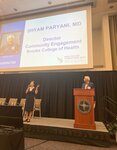

Nearly half of all adults in the U.S. (117 million people) suffer from chronic conditions with nearly 58 million suffering from two or more. Today, 86% of the total cost of U.S. health care is related to these chronic diseases. Heart conditions, chronic obstructive pulmonary disease, asthma and diabetes constitute the largest cost component.
In order to reverse this trend, we need to use innovative technology to help decrease the cost and improve the health outcomes of all patients.
These chronic conditions also have the greatest potential for leveraging digital remote medical monitoring to improve patient outcomes and reduce costs. The federal government is already reimbursing patients for this virtual, “non-face-to-face” monitoring for Medicare patients for 19 chronic conditions.
The existing internet-connected blood pressure cuffs, EKG sensors, electronic weight scales, glucometers, spirometers and other devices could be the basis for virtual care in real time. They can provide actionable real-time patient information directly to health care providers. Such information can be the basis for individual patient alerts specific to their condition and medications.
These circumstances forced us to adapt and utilize innovative approaches that helped find unique and better solutions to our health care problems. These new solutions applied not only to patients in traditional delivery settings but also allowed bringing care to the patient at home instead of the patient seeking care at a medical facility.
We now see the application of smart technologies that will continue to accelerate as patients discover the ease, efficacy and affordability of receiving care in the comfort of their home. The next phase of home health care will be shifting the focus from disease management to wellness maintenance, using technologies to detect conditions before they are clinically apparent. This new era of “Digital Health” encompasses various technologies that can improve health care delivery and outcomes.
Telehealth technology is a type of digital technology that gained a much wider acceptance during the COVID-19 pandemic. Other digital areas of application include wearable devices, health information technology, health sensors, portable diagnostic devices and virtual reality. With the widespread availability of artificial intelligence (AI), medical devices used in diagnosis, treatment and monitoring will be even more useful.
The University of North Florida (UNF) is pioneering digital health with a prospective study monitoring patients in their home setting. This research is important because it provides insight into how we conveniently and more effectively bring a broader access of medical services, such as virtual check-ups, to patients in the comfort of their own homes. We have also initiated fitness and health monitoring of our varsity students in all sports to gain important insights on optimal wellness and fitness.
The findings of this study will provide insights on how athletes can improve performance and readiness to play with a decreased likelihood of injury. Our research will provide individualized data to our athletes to help them prepare, condition and decrease injury.
UNF’s Brooks College of Health (BCH) hosted the Healthcare Symposium 2023 on Oct. 26-27. This symposium convened health care specialists from local, national and global platforms on our campus. Over 40 health care luminaries shared their visions for health care in the upcoming decade. Over 600 registrants attended the two-day event. The main program took place at UNF's Adam W. Herbert University Center. Drs. Shyam and Sharon Paryani hosted the speakers and sponsors of the symposium at their home in Ponte Vedra to thank all of the participants for their support.
Due to the tremendous success of the symposium, there are plans to continue this session annually with the next symposium scheduled for Sept. 9-10.
Shyam Paryani, MD, MHA is the director of community engagement and director of the executive master of the Health Administration Program at UNF. He is the program chairman and founder of the annual Healthcare Symposium at UNF.